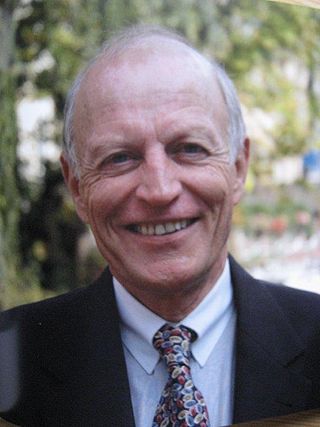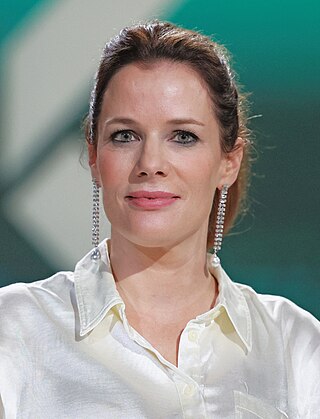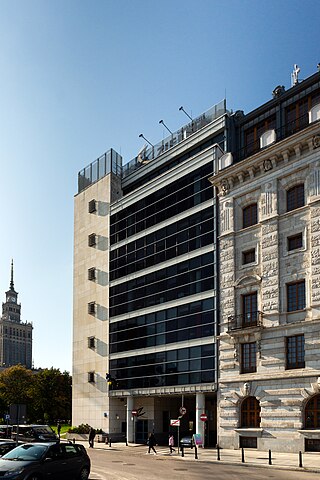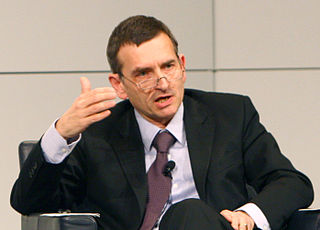
Wolfgang Friedrich Ischinger is a German diplomat who served as chairman of the Munich Security Conference from 2008 to 2022.

Gesine Schwan is a German political science professor and member of the Social Democratic Party of Germany. The party has nominated her twice as a candidate for the federal presidential elections. On 23 May 2004,she was defeated by the Christian Democrat Horst Köhler. On 23 May 2009,Köhler beat her again to win his second term.

Godelieve Quisthoudt-Rowohl is a German politician who served as a Member of the European Parliament from 1989 until 2019. She is a member of the Christian Democratic Union in Lower Saxony,which is a part of the European People's Party. She most recently served as the European People's Party's coordinator of the International Trade Committee (INTA),chairwoman of the UK Monitoring Group of INTA,vice-coordinator of the Committee on Human Rights (DROI) and vice-chairwoman of the Delegation for relations with Canada.

Angelika Niebler is a German lawyer and politician who has been serving as a Member of the European Parliament (MEP) since 1999. She is a member of the Christian Social Union in Bavaria,part of the European People's Party. Since 2015,she has been serving as her party's deputy chairwoman,under the leadership of successive chairmen Horst Seehofer and Markus Söder.

Hans Köchler is a retired professor of philosophy at the University of Innsbruck,Austria,and president of the International Progress Organization,a non-governmental organization in consultative status with the United Nations. In his general philosophical outlook he is influenced by Husserl and Heidegger,his legal thinking has been shaped by the approach of Kelsen. Köchler has made contributions to phenomenology and philosophical anthropology and has developed a hermeneutics of trans-cultural understanding that has influenced the discourse on the relations between Islam and the West.
Anneli Ute Gabanyi is a German political scientist,literary critic,journalist,and philologist of Romanian background,especially known for her research on the society and culture of the Cold War period in Romania and the Romanian Revolution of 1989. A former main analyst for Südost-Institut in Munich,she is an associate researcher for the German Institute for International and Security Issues in Berlin.

The German Institute for International and Security Affairs is a German think tank in international relations and security studies. A semi-official organization with close links to the federal government,it advises the Bundestag and the federal government on foreign and security policy issues,and also advises decision-makers in international organisations relevant to Germany,above all the European Union,NATO and the United Nations. SWP is regarded as one of Europe's most influential think tanks in international relations. It is headquartered in Berlin and incorporated as a foundation.

Dieter Mahncke is a scholar of foreign policy and security studies,and Alfried Krupp von Bohlen und Halbach Professor Emeritus of European Foreign Policy and Security Studies at the College of Europe. He is the author of books and articles on European security,arms control,German foreign policy,Berlin,US-European relations and South Africa.
Stefan Fröhlich is a German political scientist and professor for International Relations at the Friedrich-Alexander-University Erlangen-Nuremberg. The emphasis in his work is on German foreign policy,transatlantic relations and US foreign policy,European foreign and security policy,and International Political Economy.

Volker Stanzel is a retired German diplomat and the former ambassador of the Federal Republic of Germany to Japan and China as well as former Political Director. Since 2015 he works and publishes on political topics in Berlin,Germany.

Peter Weingart is a German professor emeritus in sociology and former director of the Center for Interdisciplinary Research,Bielefeld.

Michael Helmut Roth is a German politician of the Social Democratic Party of Germany (SPD) who has been serving as a member of the German Bundestag since 27 September 1998.

Gender democracy is a normative idea related to gender mainstreaming. Its aim is to achieve democratic conditions between men and women within society as a whole,as well as within companies,bureaucracies,and other organizations. Among other things,this is realized by means of gender trainings that raise awareness of existing inequalities and develop methods to democratize relations between genders. The term gender democracy was first coined and developed by German sociologist Halina Bedkowski.

Joachim Schuster is a German politician of the Social Democratic Party (SPD) who has been serving as a Member of the European Parliament (MEP) since 2014,representing Germany as part of the Party of European Socialists. From 1999 until 2006,Schuster was member of the Bürgerschaft of Bremen. From 2006 until December 2012,State Council in Bremen,first of work,youth and social issues,then of health and science.

Florence Gaub is a Franco-German researcher,security expert and futurist who focuses on foresight based policy formation for international relations and security policy. She is director of the research division at the NATO Defense College (Rome). She worked as deputy director at the European Union Institute for Security Studies (EUISS) in Paris from February 2018 until May 2022,worked as foresight advisor at the General Secretariat of the Council and is Visiting Professor at the College of Europe,member of the WEF Global Future Council on the Future of Complex Risks as well as founder and president of a think-tank and consultancy,Futurate Institute.

Astrid Freudenstein is a German civil servant and politician of the Christian Social Union in Bavaria (CSU).

The Foundation for German-Polish Cooperation,an organization established 1991 by the governments of the Republic of Poland and the Federal Republic of Germany,provides financial support for initiatives that bring Poles and Germans together.

Volker Perthes is a German political scientist,academic and writer. Apart from his focus on research,writing and teaching about the Middle East,he was director of the German Institute for International and Security Affairs (SWP). From 2021 to 2023,he served as Special Representative of the Secretary-General of the United Nations (SRSG) for Sudan and Head of the UN Integrated Transition Assistance Mission in Sudan (UNITAMS).

Sabine Fischer is a German political scientist. She currently works at the German Institute for International and Security Affairs as a specialist in Russian foreign and security policy,EU-Russia relations,unresolved conflicts in the east region of the EU,and regional relations between East Europe and Eurasia. She has published several books,articles and studies on her core topic of Eastern Europe. She advises the German Federal Government,and her expertise was and is often sought in interviews and television appearances,especially during the Russian invasion of Ukraine.



















